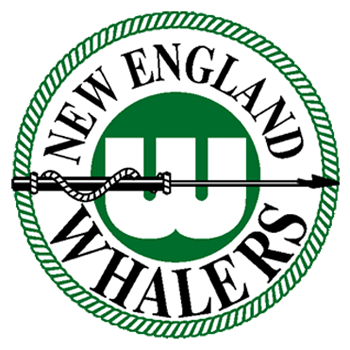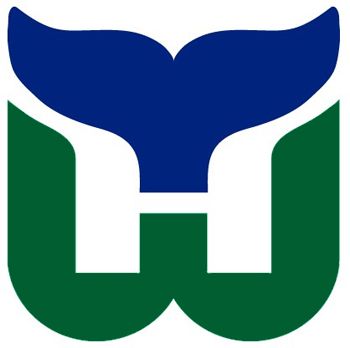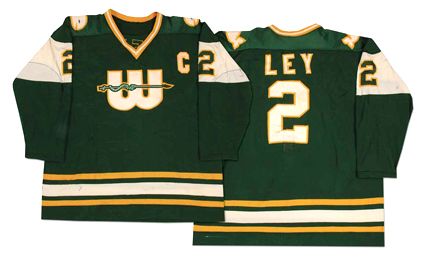Thursday, May 23, 2013
The New England Whalers Become the Hartford Whalers
Founded in 1972, the World Hockey Association began it's first season with an ambitious twelve member clubs located in Cleveland, Boston, New York, Ottawa, Philadelphia, Quebec, Edmonton, Chicago, Houston, Los Angeles, Minnesota and Winnipeg.
Team movement began before the second season had even begun, with Philadelphia relocating to Vancouver and Ottawa finding a new home in Toronto, while New York moved over to New Jersey and underwent a name change.
The third season saw expansion to Indianapolis and Phoenix, while the New Jersey franchise relocated cross-country to San Diego as Los Angeles moved to Detroit for just half a season prior to moving to Baltimore before folding for good after the season, as did Chicago.
And so it went for the next four seasons with additions such as Cincinnati and Denver, teams moving to Calgary, Ottawa again, Birmingham and Minnesota again, while clubs in San Diego, Phoenix, Calgary and Houtson folded after their seasons ended.
Worse, clubs were no longer waiting until the conclusion of the season to fold, as Ottawa, Minnesota (twice) and Indianapolis all called it quits mid-season.
Still, the four constants during all the franchise meandering and bankruptcies were the Edmonton Oilers, Quebec Nordiques, Winnipeg Jets and the New England Whalers, although in the interest of fairness it must be noted that the Whalers did relocate from Boston 91 miles up the freeway to Hartford, Connecticut midway though the 1974-75 season while keeping the "New England" moniker throughout.
The Whalers won the first WHA championship in 1973 and made the finals again in 1978. Finally after several years of negotiations and failed attempts, the Oilers, Jets, Nordiques and Whalers were granted expansion status into the NHL, leaving Birmingham and Cincinnati out in the cold. The original merger/expansion vote was initially rejected by a single vote but a massive boycott of Molson products in Edmonton, Winnipeg and Quebec City led to the Montreal Canadiens, who were owned by Molson at the time, and the Vancouver Canucks to change their votes during a second ballot, approving the plan on March 22, 1979.
One provision of the expansion, as the NHL chose to treat it, rather than a "merger", was the Boston Bruins insisting that the Whalers drop "New England" from their name. Thus, on this date in 1979, the New England Whalers formally changed their name to the Hartford Whalers.
The WHA teams were severely restricted by the terms of the deal. Since they were being treated as expansion clubs, they each were required to pay a $6 million franchise fee to enter the NHL, as well as returning any player who had left the NHL to join the WHA without compensation after being allowed to protect just two goalies and two skaters. They were also placed at the end of the line for the 1979 NHL Entry Draft, rather than having picks 1-4 as any normal expansion club would expect.
The Whalers chose to keep Jordy Douglas, Mark Howe and goaltender John Garrett. An agreement was also reached which allowed Gordie Howe to remain in Hartford despite the Detroit Red Wings legally having the right to reclaim the now 50 year old Howe.
The Whalers did lose Alan Hangsleben (Canucks), Rick Ley (Maple Leafs), George Lyle (Red Wings) and Warren Miller (Rangers) to their original clubs.
Once the reclaiming process was completed, an expansion draft was held, which allowed each NHL team to protect 15 skaters and two goalies before the "new" clubs were allowed to restock their rosters at a cost of $125,000 for each player chosen.
Thus, the Whalers paid $250,000 to simply keep Ley and Hangsleben on their roster in the end when they reclaimed the pair among the 16 players they selected at a cost of $2 million on top of the $6 million they had already been charged simply for the right to become a member of the NHL.
The move to the NHL resulted in an overhaul of the team's sweaters and logo. While the original team colors were simply green and white, gold trim was added for the second season while the crest was simplified to a "W" bisected by a harpoon. These jerseys would remain in use for three seasons before some striping changes to the road jerseys and the player's names changing from one color to two in 1976-77. The home jersey waist striping was changed to mirror that of the road jerseys in 1977-78 through the final WHA season of 1978-79.
On entry to the NHL, gold was dropped in favor of royal blue and a completely new jersey was designed to compliment the brand new, much more modernized team logo.
Today's featured jersey is a 1977-78 New England Whalers Rick Ley jersey. This was the third variation of road jerseys used by the Whalers while in the WHA and differed from the second version only in the waist stripes. No longer was it a wide white stripe with gold trim three stripe pattern, but now a main white stripe (thinner than previous) bordered with a pair of green stripes which were then in turn bordered by a pair of gold stripes in a five stripe "Northwestern" pattern as featured on today's jersey.
Ley played four seasons with the Toronto Maple Leafs prior to moving to the Whalers for their inaugural WHA season of 1972-73 through the demise of the WHA in 1979, being named team captain in 1975.
While Ley was reclaimed by the Maple Leafs as part of the expansion process, the Whalers reclaimed him from the Maple Leafs (for $125,000) and he played two more seasons with the renamed Hartford Whalers in the NHL, remaining team captain until 1980.
He would play 310 NHL games and 478 in the WHA with a combined 47 goals and 329 points plus 1244 penalty minutes. His #2 was one of only three numbers retired by the Whalers franchise.
Today's video section begins with Rick Ley scoring a shorthanded goal with speed and a nifty move for the Whalers.
Here Ley is later interviewed later on in the same game.
Here is a video scouting report on Ley with rare video clips from the Whalers very first season of 1972-73 using their original jerseys featuring the circle crest.
Our final clips today are the kind we just live for. First, the Whalers are introduced to the sounds of "Brass Bonanza" in an all-too-short clip, followed by game action from their December 27, 1976 Super Series meeting in which the New England Whalers defeated the Soviet National Team, with Vladislav Tretiak in goal, 5-2!
Labels:
Hartford Whalers,
Ley Rick,
New England Whalers,
WHA
Subscribe to:
Post Comments (Atom)














No comments:
Post a Comment
We welcome and encourage genuine comments and corrections from our readers. Please no spam. It will not be approved and never seen.